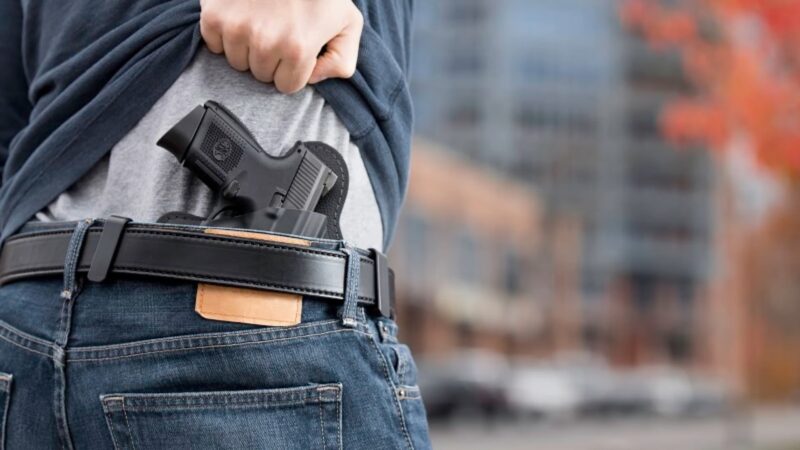Obtaining a concealed carry permit (CCP) that’s valid nationwide involves navigating complex state laws and the absence of federal reciprocity. The Second Amendment permits concealed carry, yet state-specific regulations govern CCP issuance and rules, which include varying requirements for both firearms and ammunition.
Enhancing the ability to legally carry across states can be achieved by obtaining CCPs from certain states known for their wide reciprocity and recognition in over 30 states. Acquiring multiple CCPs is another strategy, particularly beneficial for those who travel often or live near state borders.
This approach, however, demands staying informed about ever-changing reciprocity agreements and state-specific ammunition regulations. Getting to know the concealed carry laws, including restrictions regarding ammunition, of each state is essential.
This endeavor, much like collecting distinct items from various states, is a challenging but attainable task for dedicated, law-abiding citizens.
Why is it Impossible?
Obtaining a concealed carry permit (CCP) valid in all 50 states is currently impossible for civilians. However, there are steps you can take to maximize your ability to carry concealed across the country:
- Obtain a CCP in your home state. This is the foundation for your concealed carry rights.
- Acquire non-resident CCPs from states with wide reciprocity. States like Utah, Arizona, and Florida offer non-resident permits that are recognized by over 30 other states.
- Stay informed about changes to concealed carry laws and reciprocity agreements. The landscape of concealed carry laws is constantly evolving, so it’s important to stay up-to-date on the latest developments.
By following these steps, you can significantly increase the number of states where you can legally carry concealed.
Nationwide Concealed Carry Permits
The Law Enforcement Officers Safety Act (LEOSA) of 2004 is the only federal law that allows a certain group of individuals – active and retired law enforcement officers – to carry concealed firearms across state lines, overriding state and local laws. This privilege, however, does not extend to the general public.
For non-law enforcement citizens, the rules for concealed carry vary significantly from state to state, making it virtually impossible to legally carry in all 50 states.
Permit Laws Vary By State
Concealed carry permits in the United States are subject to state jurisdiction, leading to a lack of uniformity in laws and reciprocity agreements. Reciprocity, the mutual recognition of permits between states, varies widely.
Some states, like Utah, Arizona, and Florida, have permits that are recognized by over 30 other states, while others have very limited reciprocity. This disparity is rooted in the fact that concealed carry falls under “public policy,” which is governed at the state level in the absence of overriding federal law.
The Patchwork of State Laws
Reciprocity agreements between states are key to understanding where your concealed carry permit is valid. However, these agreements are not universal.
A permit holder must be aware of which states recognize their permit and under what conditions. This requires diligent research and staying updated on changing laws and agreements.
Strategies for Maximizing Legal Carry
For those seeking to maximize their legal carry capabilities, obtaining multiple permits can be a strategy. Some individuals choose to acquire a non-resident permit from states with wide reciprocity, such as Utah, Arizona, or Florida, in addition to their home state’s permit.
This approach can expand the number of states where they can legally carry, though it still won’t cover all 50 states.
The Prospect of National Reciprocity
The concept of national reciprocity, where a concealed carry permit from one state would be valid in all, has been a topic of legislative attempts but faces significant constitutional hurdles. Bills like the ‘Concealed Carry Reciprocity Act of 2017′ have been introduced but have failed to pass, largely due to constitutional concerns and the principle of states’ rights in setting their own public policy.
The Best Strategy for Maximum Coverage
For responsibly armed citizens seeking to maximize their ability to carry across states, the current best strategy is to obtain a permit in their home state and then acquire non-resident permits from states like Utah, Arizona, or Florida, which have wider reciprocity. This approach, while not offering complete coverage, can significantly increase the number of states where one can legally carry concealed.
State-Specific Concealed Carry Laws
One of the most challenging aspects of concealed carry for civilians is the diverse and often conflicting nature of state-specific laws. Each state has its own set of regulations, criteria for issuing permits, and restrictions on where a firearm can be carried.
This complexity necessitates a thorough understanding of not just one’s home state laws but also those of any state one plans to visit.
Reciprocity Agreements
Reciprocity agreements between states can be a double-edged sword. On one hand, they allow permit holders to carry their firearms across state lines without needing separate permits for each state.
On the other hand, these agreements can be limited and are subject to change, making it essential for permit holders to stay informed about current laws and agreements.
The Role of Non-Resident Permits
Non-resident permits play a crucial role in expanding a gun owner’s ability to carry concealed across more states. However, it’s important to note that obtaining these permits requires meeting the issuing state’s requirements, which may include background checks, training courses, and other criteria.
The Impact of Legal and Political Factors
The landscape of concealed carry laws is not only shaped by public policy but also by legal and political factors. Court cases, such as NYSPRA v Bruen, influence the interpretation and enforcement of these laws.
Additionally, the political climate and public opinion play significant roles in shaping legislation at both state and federal levels.
The Constitutional Debate
The debate over concealed carry and gun rights often centers around the interpretation of the Second Amendment. While the amendment protects the right to bear arms, its application to concealed carry and the extent of state versus federal jurisdiction remain contentious issues.
This ongoing debate influences both existing laws and the potential for future changes, including the possibility of national reciprocity.
Future Prospects for National Reciprocity
While national reciprocity remains a goal for many gun rights advocates, its realization faces significant legal and constitutional challenges. Past attempts to pass national reciprocity legislation have been unsuccessful, and any future efforts would need to navigate the complex interplay of state rights, public policy, and constitutional law.
For now, gun owners must navigate the existing patchwork of state laws and reciprocity agreements.
FAQ
Why get multiple concealed carry permits?
Multiple concealed carry permits allow legal carrying in more states, offer backup in case of permit loss, and adapt to changes in state reciprocity laws.
What are the challenges in navigating state-specific concealed carry laws?
Concealed carry challenges include understanding diverse state laws, which vary in regulations, permit criteria, and carry restrictions. Reciprocity agreements are limited and changeable, necessitating continuous awareness of current laws.
How to stay informed about concealed carry laws and agreements?
Stay informed by subscribing to concealed carry organizations like the NRA or USCCA, which update on laws and reciprocity changes. Also, state concealed carry websites and authorities provide alerts about legal changes.
What influences concealed carry law changes?
Concealed carry laws are influenced by public policy, court decisions, and the political climate. Cases like NYSPRA v Bruen and political and public opinions significantly shape state and federal legislation.
What is the status of the national concealed carry reciprocity debate?
National reciprocity faces hurdles, with attempts like the “Concealed Carry Reciprocity Act of 2017” failing due to constitutional and state rights concerns.
What is maximizing state-to-state carry for gun owners?
Maximizing carry across states involves obtaining home-state permits and non-resident permits from states with broad reciprocity. Awareness of specific non-resident permit requirements is crucial.
Final Words
In conclusion, while the dream of a single concealed carry permit valid in all 50 states remains elusive, understanding and navigating the current landscape is crucial for responsible gun owners. This involves not only being aware of one’s home state laws but also understanding the intricacies of reciprocity and non-resident permits.
Staying informed about legal and political developments is also key, as these can significantly impact the concealed carry landscape. By being proactive and educated, gun owners can responsibly exercise their rights while complying with the diverse legal frameworks across the United States.









